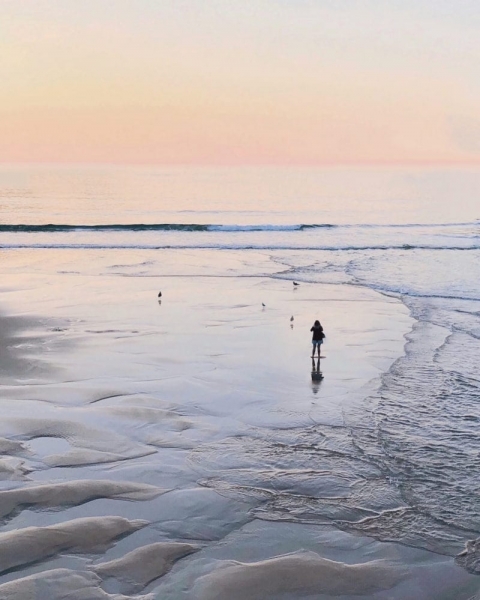The Courage to Stay


What does it look like to stay when things are hard?
I have come up against this question a lot in the last 365 days. With a pandemic that changed the way we live, how we communicate and where we are able to travel in one fell swoop, life has been difficult.
Difficult doesn’t seem to suffice. At times, it has been gut-wrenching.
Living in Los Angeles, this jarring heaviness has been impossible to escape. When people asked about visiting my beloved City of Angels in 2020, I discouraged it. The last 12 months have looked a lot like waving goodbye to another friend as they pack up and move away, watching owners board up their businesses for the last time, and walking deserted streets at sunset dodging another masked passerby.
L.A. has lost a lot of the freedom, spontaneity and joy that makes her L.A. It hasn’t been the same.
L.A. has lost a lot of the freedom, spontaneity and joy that makes her L.A.
This place has always been a hard city to make it in, but in this past year, that feeling of “hard” has only been amplified. There have been moments when I’ve wanted to quit too—pack my bags and leave SoCal in my dust. To be honest, I’ve wanted to quit a lot of things. It’s been a mood I’ve been in lately. Quit. Run away. Pack up and leave.
And then I was confronted with this notion: What does it look like to stay when things are hard?
Stay.
This not only applies to a physical location, but also in relationships. What does it look like to stay in a friendship, at a job or in a romantic relationship when things are hard? Oftentimes, when things get hard, the easiest and most opportune choice seems to be to cut your losses and leave.
A common form of this in our culture today is “ghosting” or “deading” people in communication. We get angry or uncomfortable in conflict, and we simply stop responding. It’s easy. It’s safe. It requires the least amount of effort.
But what would it look like to stay in these moments? What would it look like to sit in uncomfortable places, to have hard conversations with people, to weather the storms of life and resolve to stay put until it passes? (This does not apply to abusive, toxic or manipulative relationships. You should never stay in a place or relationship where you are unsafe.)
What would it look like to sit in uncomfortable places, to have hard conversations with people, to weather the storms of life and resolve to stay put until it passes?
I want to be the type of person who knows how to weather the storm. I want to be a friend who shows up to the table when I’ve hurt a friend or when someone has hurt me to have the hard conversations necessary for reconciliation. I want to be the team player who, instead of putting her two weeks’ notice in at the first sign of trouble, pursues clarifying conversations and commits to continued open dialogue. I want to be the daughter and sister who is willing to dig her heels in and work through the really messy and sometimes painful parts of family.
What I have been finding lately is that the more I stay in these tough moments, the more I mature and grow. It is difficult. It is humbling. It is hard, but it is also worth it.
I want to be the woman who knows how to stay. The reward—growth in communication, in patience, in listening, in forgiveness, in perseverance—is worth the long and sometimes painful journey. As I continue to learn to stay in hard moments, I notice myself growing in gentleness and graciousness toward myself and others.
I want to be the woman who knows how to stay.
As I looked out at another Los Angeles sunset on my drive home today, soft hues of coral and amber painted the sky. I thought to myself, “OK, L.A. I’ll hold on a little longer. I’ll stay.”
Have you ever walked away from a relationship because you were afraid of conflict? What does it mean to show up and sit in uncomfortable places?
Image via Judith Pavón Sayrach
Leave a Reply